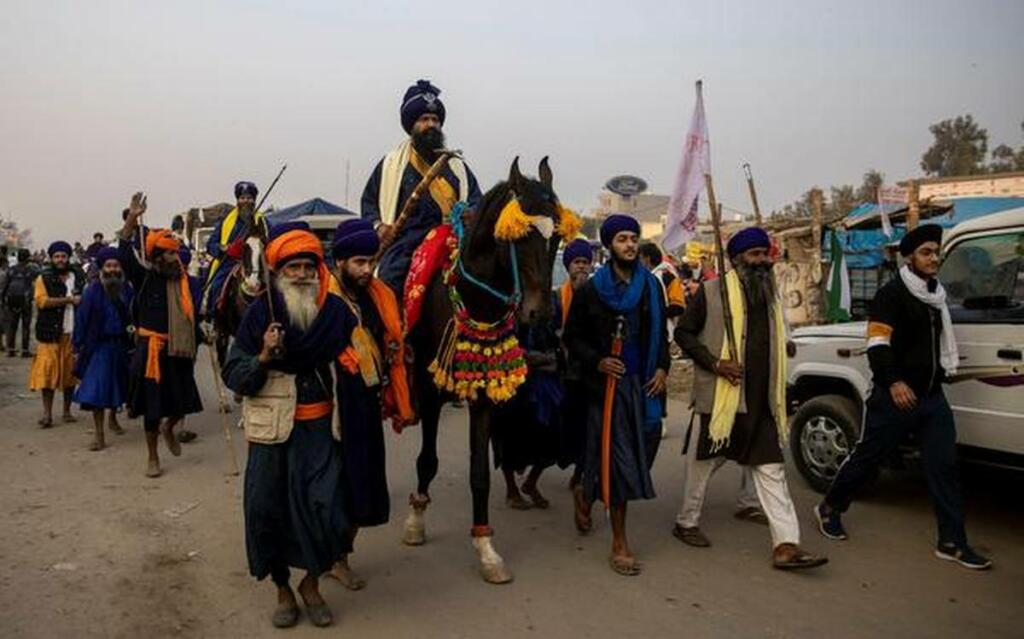The protest site at the Singhu border was supposed to voice farmers’ concerns. But the site of protest first became a hotbed of Khalistani agenda and now it has become the site of mob rule and street justice. The issue is becoming more religious and casteist as Lakhbir Singh was hacked to death over allegations of ‘sacrilege’.
Nihang group admits to killing the Dalit man:
A Nihang group, Nirvair Khalsa-Udna Dal, has admitted to killing Lakhbir Singh at the Singhu border on Friday.
Nihangs are an order of Sikh warriors. They are characterized by blue robes, antiquated arms such as swords and spears. They also wear decorated turbans and trace their origin to the founding of the Khalsa by the last Sikh Guru, Guru Gobind Singh in the year 1699.
Why was Lakhbir killed?
Lakhbir’s killing is an act of mob justice through extra-judicial methods. As per India Today, Balwinder Singh, Panth – Akali, Nirvair Khalsa-Udna Dal said, “He (Lakhbir) did seva (service) at our camp, won our trust.”
Balwinder Singh added, “Before the Prakash Prayer (offered around 3 AM), he removed the cloth to cover the holy scripture and insulted the Pothi Sahib (translation book).” Balwinder Singh said that the deceased ran away as the Nihangs chased him, and he was finally caught and attacked near a private hospital. The holy book was recovered from him by the Nihangs.
#NewsAlert | Nihang Group claims ‘we guard the protesting site. The man (who lost his life at #SinghuBorder) infiltrated to protesting site’.
Listen in. | #SinghuLynchingHorror pic.twitter.com/At7PuN7LSq
— TIMES NOW (@TimesNow) October 15, 2021
A purported video of the incident that went viral on social media shows some Nihangs standing in while the helpless Lakhbir Singh lies in a pool of blood and his chopped hand lies next to him. The Nihangs can be seen asking from where he had come and who sent him to commit sacrilege, whereas the man in excruciating pain mutters something in Punjabi and pleads before the Nihangs.
The gruesome killing has barbarity written all over it. Lakhbir Singh, a Dalit Sikh, was asked certain questions about the alleged sacrilege of the holy book and on being satisfied with their allegations, an unruly mob decided to dispense a brutal form of justice on the spot.
Blasphemy and caste angles involved?
Chairman of the National Commission for Scheduled Castes (NCSC) Vijay Sampla said, “The incident in which a Scheduled Caste man was killed and his hand chopped off at the Singhu border is a heinous Talibani crime.”
The mainstream media may not be talking about the caste angle. However, the caste link cannot be dismissed casually. The way Lakhbir Singh, a Dalit Sikh, was killed illustrates why caste politics is becoming such an important issue in Punjab.
Lakhbir Singh was killed over unconfirmed allegations of desecration of a holy Sikh book. There are inconsistent versions of the incident- some say he tore the holy book or threw it in the dustbin, whereas others alleged that he was about to burn the holy book. Without any clarity, the mob assumed that Lakhbir desecrated the holy book and decided to execute him.
Recently, Charanjit Singh Channi, a Dalit Sikh, was appointed as Punjab’s Chief Minister. The political arithmetic in Punjab also means that any political party needs the support of the Dalit community to perform well in the state.
As far as the question of blasphemy goes, it is not difficult to understand how the issue can be misused against the weaker sections of society. In Pakistan, for example, the Ahmadis, Hindus, Christians and Sikhs are often slapped with charges of desecration of the Holy Quran under the draconian blasphemy law. In Singhu border, Lakhbir became a victim of similar blasphemy allegations.
The law enforcement system must catch up:
Balwinder Singh said, “Whoever indulges in an act of sacrilege, we will treat them in this manner only. We won’t approach any police, administration.” Last year, a Nihang group chopped off the hands of an Assistant Sub Inspector of Punjab Police in Patiala after being asked for a COVID-19 curfew pass.
The fact remains that the Nihang order has been respected within Punjab and other areas. Nihang members are allowed to carry sharp weapons because of religious sensitivities. They are expected not to use them by Indian law. However, even during the Republic Day violence, Nihangs mounted on horsebacks with spears and swords in their hands reportedly led the charge to disperse police personnel.
The Modi government must make up its mind to restore law and order at the Singhu border. Political ramifications must take a backseat and respect the law enforced at the Singhu border, which has become a site of anarchy.
